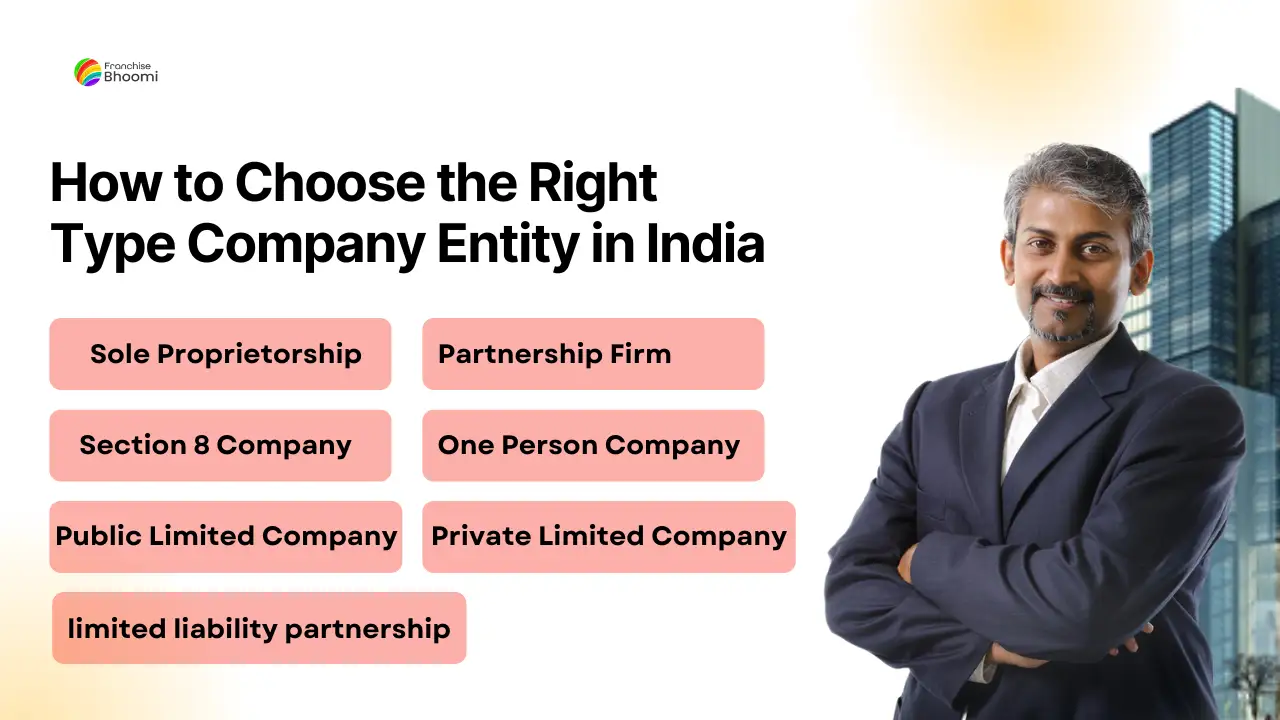Starting a business is an exciting journey, but one of the first and most important decisions you’ll make is choose the right company entity for your company. Your business structure will not only determine your tax liabilities but also how you manage the business, raise funds, and protect your personal assets. In this guide, we’ll walk you through the key considerations to How to choose the right company entity in India.
Let’s Breakdown together!
Why is Choosing the Right Company Entity Type Important?
The type of company you choose has long-term implications for your business, including:
- Liability protection for your personal assets
- Taxation policies and benefits
- The ease of raising capital for business expansion
- Compliance requirements such as audits, annual filings, etc.
- Management structure and control over decision-making
Understanding these implications helps you make a well-informed decision that aligns with your business vision and growth plans.
Types of Companies in India
Before you choose the right company entity, it’s important to understand the available options. Below is a brief overview of the common business structures in India:
| Type of Company | Ideal For |
|---|---|
| Sole Proprietorship | Small businesses, freelancers |
| Partnership Firm | Small to medium-sized businesses |
| Limited Liability Partnership (LLP) | Professionals, consultants |
| Private Limited Company (Pvt Ltd) | Startups, growing businesses |
| Public Limited Company | Large businesses |
| One Person Company (OPC) | Solo entrepreneurs |
| Section 8 Company | Nonprofits, charitable organizations |
| Hindu Undivided Family (HUF) | Family-run businesses |
To Know more: Types of Companies in India
Now stepping into the How to choose the right company entity for your business
Steps to Choosing the Right Company Type
1. Evaluate Your Business Size and Nature
The first thing to consider is the size and nature of your business. If you’re starting small with limited capital, a sole proprietorship might be an excellent option. If you plan to work with a partner or multiple partners, a partnership firm or LLP may be better suited.
For businesses planning to scale or attract investors, a Private Limited Company is ideal. Public companies are better for large corporations with plans to raise capital by offering shares to the public.
2. Consider Liability Protection
Protecting your personal assets from business liabilities is a key concern for many entrepreneurs. If you want to limit your personal liability, avoid sole proprietorships and general partnerships, as owners are fully responsible for business debts.
Instead, opt for structures like LLP, Private Limited, or One Person Company, where your personal assets are protected, and your liability is limited to your investment in the company.
3. Assess Your Future Growth Plans
Your business structure should match your long-term growth plans. If you’re looking to raise capital or invite investors in the future, a Private Limited Company allows you to issue shares and bring in external funding.
If your business is more focused on professional services and doesn’t need a large capital base, an LLP is a simpler, more flexible structure.
4. Taxation Considerations
Different business structures have different taxation rules. For instance, sole proprietors are taxed as individuals, meaning the business income is treated as personal income. On the other hand, Private Limited Companies are subject to corporate tax rates, which could be beneficial for larger profits.
Non-profits, such as Section 8 Companies, enjoy various tax exemptions but must strictly adhere to charitable purposes.
5. Compliance and Legal Requirements
Each business structure has different compliance levels and legal requirements. Sole proprietorships and Partnership firms have fewer regulations but offer less protection. LLPs and Private Limited Companies, while offering better protection, come with more legal obligations, such as annual filings, board meetings, and audits.
Understanding how much time and resources you can dedicate to meeting these requirements will help you decide which structure is right for you.
6. Flexibility and Control
Some business owners prefer to have complete control over their company. A sole proprietorship or One Person Company (OPC) allows for full control by a single owner. In contrast, structures like a Private Limited Company or Partnership Firm involve more stakeholders and shared decision-making.
If you value flexibility and ease of management, an LLP offers a good balance between structure and autonomy.
Matching Company Types with Business Goals
| Business Goal | Recommended Company Type |
|---|---|
| Limit personal liability | LLP, Private Limited Company, OPC |
| Start a small business with low capital | Sole Proprietorship, Partnership |
| Raise capital through investors | Private Limited Company, Public Limited Company |
| Provide professional services | LLP, Sole Proprietorship |
| Manage a family-run business | Hindu Undivided Family (HUF) |
| Establish a charitable organization | Section 8 Company |
Comparison of different Business Entities in India
| Type of business entity | Suitable for | Limited Liability protection | Regulatory compliance | Tax Rates |
| Sole proprietorship | Sole promoters | No | Very low | As per tax slab |
| Partnership Firm | Small businesses with 2 or more partners | No | Low | Flat 30% |
| One person company | Sole promoters | Yes | Moderate | Different tax rates 15%/22%/25%/30% |
| Limited Liability partnership | Small businesses with 2 or more partners | Yes | Moderate | Flat 30% |
| Private Limited Company | Start-ups and growing companies | Yes | Moderate | Different tax rates 15%/22%/25%/30% |
| Public Limited Company | Start-ups and growing companies | Yes | Higher than private limited | Different tax rates 15%/22%/25%/30% |
| Section 8 company | Companies with charitable objectives | Yes | High | Exempt if charitable activities and necessary registrations are taken. |
Real-Life Scenario: How to Choose the Right Company
Imagine you’re a solo entrepreneur starting an e-commerce business. Initially, you’ll be the only person managing the company, so opting for an OPC or sole proprietorship seems logical. However, you plan to expand and bring in investors within two years. In this case, registering as a Private Limited Company from the beginning makes more sense because it will allow you to scale without needing to restructure later.
Alternatively, if you’re starting a professional service like consulting, an LLP provides flexibility in management while limiting your personal risk.
Conclusion
Choosing the right company type is crucial for both the short-term and long-term success of your business. It’s important to assess your business goals, liability concerns, capital requirements, and growth plans before making a decision. Whether you’re a solo entrepreneur, working with partners, or starting a non-profit, India’s diverse business structures offer something for everyone.
If you’re unsure about which type of company is best for you, seeking professional advice from a business consultant or legal expert can ensure you make the right choice from the start.
By carefully considering each factor and understanding the implications of each company type, you’ll set your business up for success and long-term growth.
PS: Please help me improve my content, share your feedback by clicking any of the emojis below 👇





Pingback: Types of Companies in India